Brexit Minister urges MSPs to back changes to repeal bill
- Published
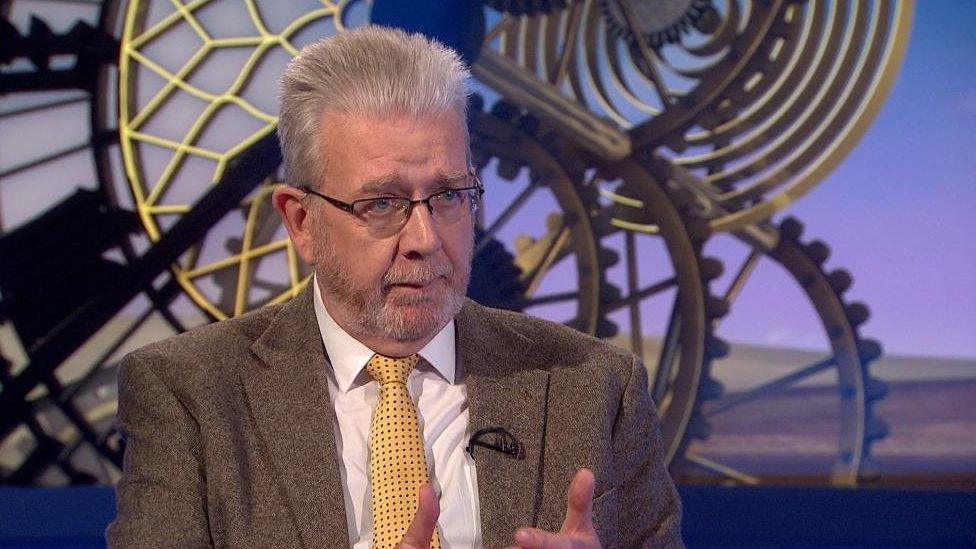
Scotland's Brexit Minister Mike Russell has written to MSPs seeking support
Scotland's Brexit Minister Mike Russell has urged MSPs to back calls for changes to the repeal bill to guarantee protection for devolved powers.
The legislation, external will convert EU law into British law.
First minister Nicola Sturgeon has described it as a "naked power grab" as it does not immediately return EU powers to devolved administrations.
But Scottish Secretary David Mundell has insisted the bill would result in a powers "bonanza" for Holyrood.
Speaking on the BBC's Sunday Politics Scotland programme, Mr Russell said the bill was "badly drafted" and "unworkable".
He said he believed the UK government would use it to make decisions on matters which should be devolved without consulting the Scottish government or Holyrood.
He also warned of a "constitutional crisis" if Westminster ignores the Scottish Parliament withholding consent for the repeal bill.
The legislation, published earlier this week, is designed to transpose EU law into British law so the same rules apply on the day of Brexit as the day before, while giving parliaments and assemblies in Westminster, Edinburgh, Belfast and Cardiff the power to drop or change them, in devolved areas, in the future.
Both Nicola Sturgeon and Welsh First Minister Carwyn Jones have said they would not recommend legislative consent for the bill as it stands.
Mr Russell has written to all MSPs seeking support for the Scottish government's position.
He said that Scotland "risks having to fight for powers that should rightfully belong to the Scottish Parliament" because the legislation "contains no promise to protect these".
His letter highlighted concerns that the bill enables UK-wide frameworks on devolved matters to be "imposed" by the UK government rather than "agreed" with the devolved administrations.
On the Sunday Politics Scotland programme, Mr Russell revealed that the Scottish government had seen a draft of the repeal bill two weeks ago.
"The normal thing for a bill of this nature would be that officials would work together over a long period of time to get it right because it affects Scotland so much," he said.

What is the repeal bill?
Formally known as the European Union (Withdrawal) Bill, the draft legislation is a key plank of the government's Brexit strategy
The first line of the bill says the European Communities Act 1972, which took Britain into the EU, will be "repealed on exit day"
This will end the supremacy of EU law and stop the flow of new regulations from Brussels
But all existing laws derived from the EU will continue to be in force - they can be changed or scrapped by further legislation
The bill does not detail policies line-by-line but transfers all regulations into domestic law
It gives the UK two years after Brexit to correct any "deficiencies" arising from the transfer

Mr Russell went on: "Up until now there is a list of things that are devolved and a list of things that are reserved.
"Now there will be areas which are neither, or both, and decisions will be made by UK ministers without consulting the Scottish Parliament and Scottish government on matters which are actually devolved. That is unacceptable and it would lead to chaos."
Asked if he was concerned that the UK government would use "these so-called Henry VIII powers" - which enables UK-wide frameworks to be drawn up without going to Parliament - to decide what was devolved and what was not, he said: "Of course, that is what they are intending to do."
The UK government said it expected the outcome of the process to be "a significant increase in the decision-making power of each devolved administration".
A spokesman added: "We welcome the Scottish and Welsh governments recognising common frameworks may be needed in some areas. Our aim is to establish common frameworks only where they are needed."
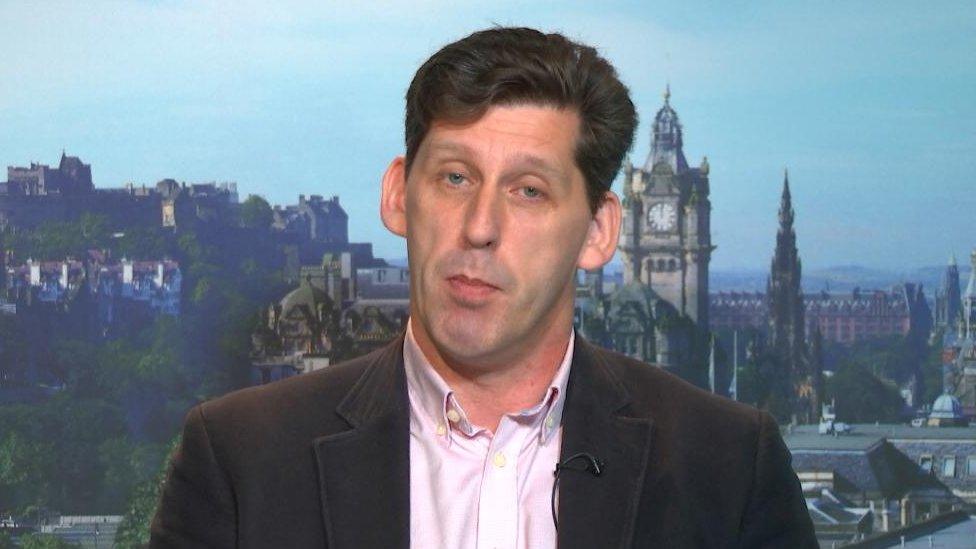
Dr Ian Duncan warned against "brinkmanship" from the Scottish government
Nicola Sturgeon has she could not recommend that the Scottish Parliament give the repeal bill its backing, in its current state.
Also speaking on the Sunday Politics Scotland programme, Dr Ian Duncan, Undersecretary of State for Scotland, warned against entering into "a period of brinkmanship".
Asked if the UK government would make decisions on what was devolved and what was not, without consultation, he said: "What we are talking about in this interim period is a transition period."
He added "These powers will be used to determine what should be part of a common framework, replacing the common framework of the EU, and that should be done through an agreement between each of the particular powers moving forward.
"There will also be elements that go straight back to Scotland, to Wales, to Northern Ireland because they do not fit into a necessary component of a common framework."
'Central role'
In a briefing to journalists following the publication of the repeal bill, Scottish Secretary David Mundell said: "This is not a power grab, it is a power bonanza for the Scottish Parliament because after this bill has been implemented the Scottish Parliament will have more powers and responsibilities than it has today."
Scottish Labour has called for a "jobs-first Brexit" which will protect workplace rights, consumer rights or environmental standards.
A party spokesman said: "Labour will seek a clear and binding commitment to repatriate powers in devolved areas to the Scottish Parliament. We will insist this must be done in a short, but achievable timeframe.
"Labour has been clear that unless the Tory government addresses the issues we have raised, we will not be supporting the bill as it stands.
"Labour will however seek to amend the bill in the UK Parliament, and our attitude to legislative consent motion in the Scottish Parliament will depend on what amendments are made at Westminster."
Scottish Liberal Democrat business manager Mike Rumbles described the bill as a "huge executive power grab" and said his party would work with others to protect devolution.
He added: "It is essential that the Scottish government and the Scottish Parliament have a central role in devolved policy areas and that any powers repatriated from the EU in these areas come to Scotland."
The Scottish Greens said the bill was "a significant threat to the devolved parliaments in Wales and Scotland, attempting to impose UK-wide arrangements on what are devolved powers rather than negotiate for agreed frameworks".
- Published14 July 2017
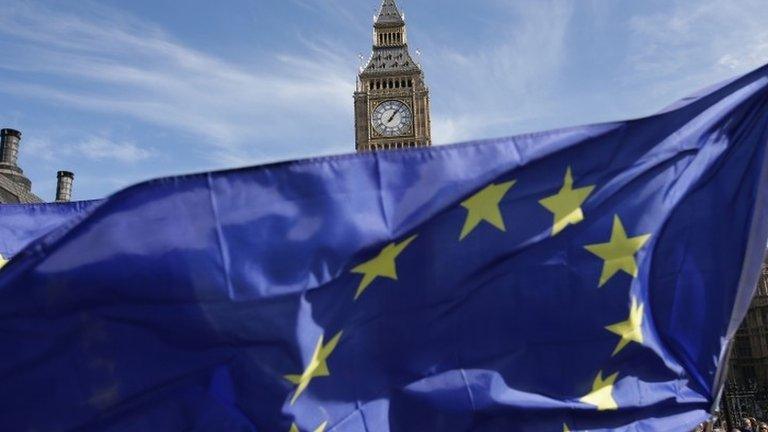
- Published13 July 2017
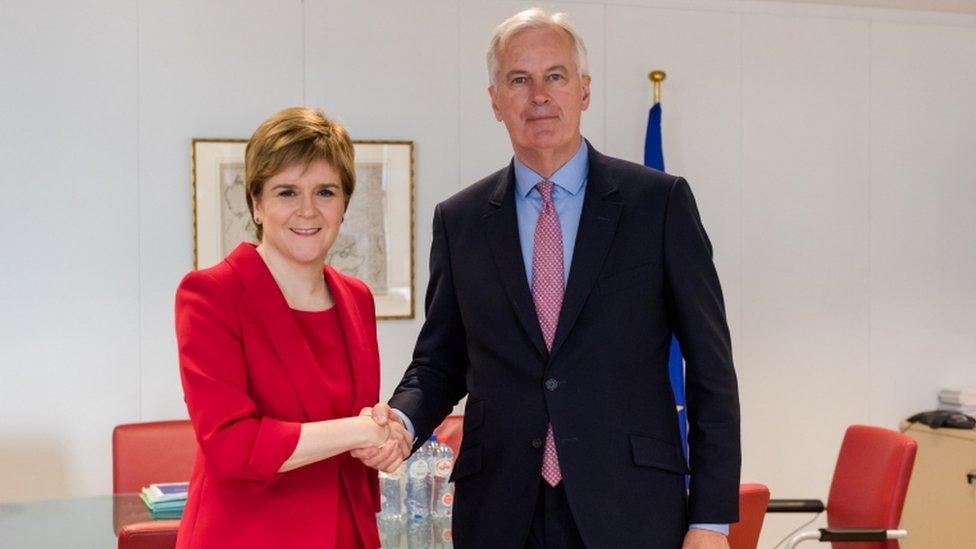
- Published13 November 2017
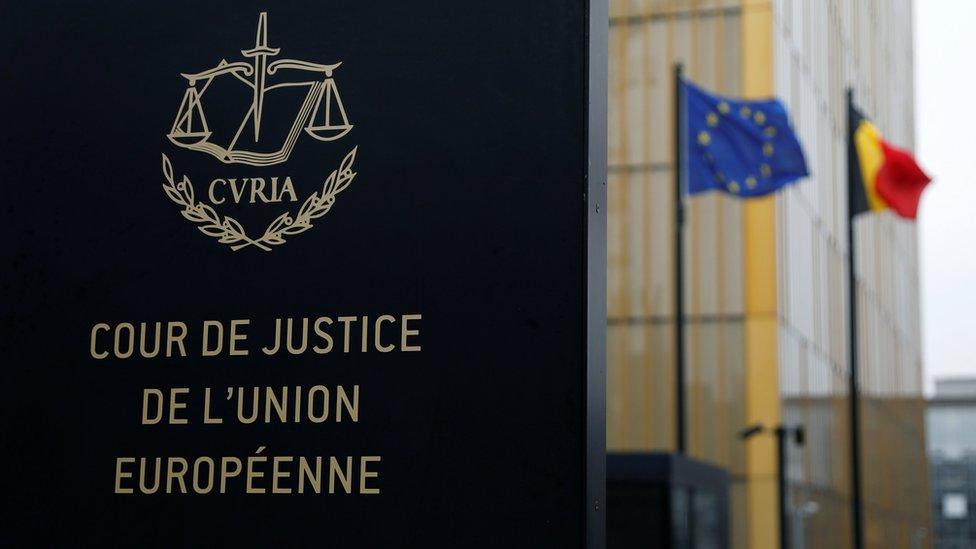
- Published31 August 2017
